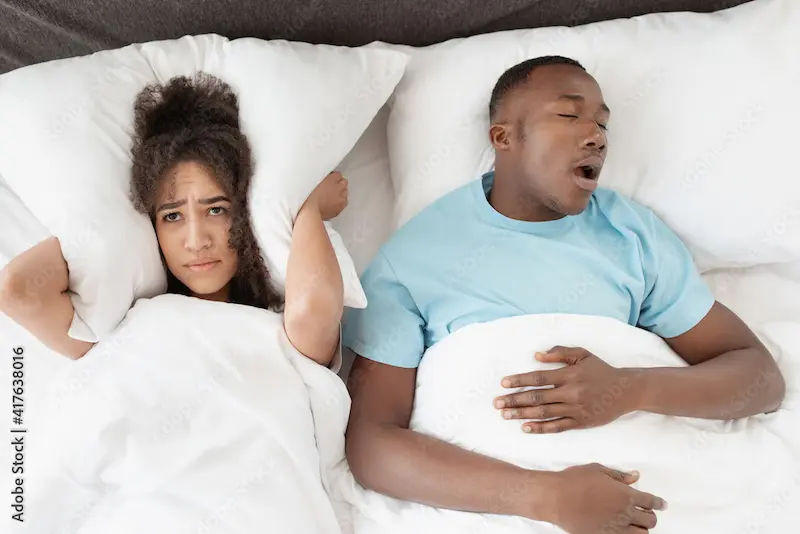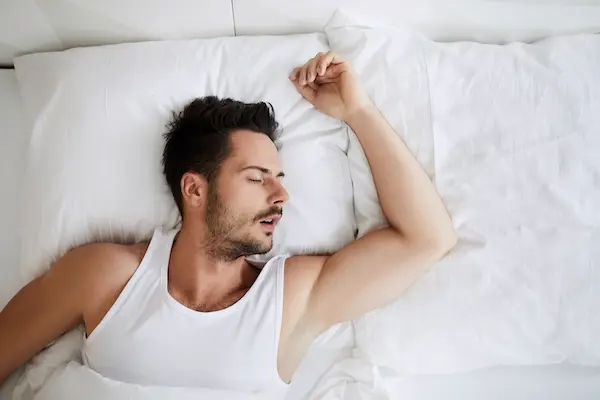Guide to Stop Snore 3
Discover the ultimate guide to stop snoring with lifestyle changes, anti-snoring devices, exercises, and medical advice for peaceful, restorative sleep.

Written by Dr. Dhankecha Mayank Dineshbhai
Reviewed by Dr. Rohinipriyanka Pondugula MBBS
Last updated on 13th Jan, 2026

Introduction
Tired of being elbowed in the middle of the night? You're not alone. Snoring is a common issue that disrupts the sleep of millions, straining relationships and impacting overall health. But what if you could understand the "why" behind the roar and discover practical, effective strategies to silence it? This definitive guide, Stop Snore 3, is your comprehensive resource to reclaim peaceful nights. We'll move beyond quick fixes and delve into the science of snoring, explore proven lifestyle changes, evaluate effective devices, and introduce strengthening exercises. Most importantly, we'll help you identify when that simple snore might be a sign of a more serious condition like sleep apnoea, and guide you on when to seek professional help. Get ready to unlock the secrets to quieter, more restorative sleep for you and your partner.
What is Snoring? The Science Behind the Sound
At its core, snoring is the hoarse or harsh sound that occurs when air flows past relaxed tissues in your throat, causing them to vibrate as you breathe. It’s essentially a sign of partially obstructed breathing during sleep.
The Anatomy of a Snore: How Airflow Creates Noise
Imagine a flag flapping in the wind. The stronger the wind, the louder the flapping. Similarly, when the airway in the back of your nose and throat becomes too narrow, the flow of air increases in speed. This faster airflow causes the soft tissues—your soft palate, uvula, tonsils, and tongue—to vibrate violently against each other, producing the familiar snoring sound. The degree of obstruction dictates the volume and tone.
Key Factors That Contribute to Snoring
Several anatomical and lifestyle factors can narrow your airway and lead to snoring:
- Mouth Anatomy: A low, thick soft palate or elongated uvula can narrow the opening.
- Alcohol Consumption: Alcohol relaxes throat muscles, decreasing your natural defence against airway obstruction.
- Nasal Problems: Chronic nasal congestion or a deviated septum limits airflow through your nose, forcing mouth
breathing. - Sleep Deprivation: Not getting enough sleep can lead to further throat relaxation.
- Sleep Position: Sleeping on your back allows gravity to pull down on the tissues of the throat, narrowing the airway.
Beyond the Noise: Is It Just Snoring or Something More Serious?
While often just a nuisance, loud, persistent snoring can be a primary indicator of Obstructive Sleep Apnoea (OSA).
This is a critical distinction to make.
Understanding Sleep Apnoea: The Major Red Flag
Sleep apnoea is characterised by repeated episodes where breathing stops and starts throughout the night. These pauses can last from ten seconds to over a minute and may occur hundreds of times per night. Each time, your brain briefly wakes you up to restart breathing, fragmenting your sleep and preventing you from reaching deep, restorative stages. This leads to excessive daytime fatigue and poses serious health risks, including high blood pressure, heart disease, and stroke.
Symptoms That Warrant a Doctor's Visit
How can you tell the difference? If your snoring is accompanied by any of the following, it's time to consult a professional:
- Witnessed breathing pauses during sleep.
- Gasping or choking sounds at night.
- Excessive daytime sleepiness (e.g., falling asleep at work or while driving).
- Morning headaches.
- Difficulty concentrating.
- Irritability.
If you experience these symptoms, it's crucial to consult a doctor. You can easily book an online consultation with a sleep specialist on Apollo24|7 for a preliminary assessment and guidance on the next steps, which may include a sleep study.
Consult a Specialist for Personalised Advice
Lifestyle Tweaks: Your First Line of Defence Against Snoring
Before investing in gadgets, the most effective solutions are often simple lifestyle modifications that address the root causes.
The Impact of Weight Management on Snoring
Excess weight, especially around the neck, can put pressure on your airway, causing it to collapse more easily during sleep. Studies show that even a modest weight loss of 5–10% can significantly reduce the frequency and intensity of snoring. It's not about drastic diets but sustainable changes to nutrition and physical activity.
How Sleep Position Can Be a Game-Changer
Sleeping on your back is the worst position for snorers. A simple yet powerful remedy is to encourage side sleeping. The "tennis ball trick"—sewing a tennis ball into the back of a pyjama top—is a classic DIY method. Today, there are also sophisticated wearable sleep position trainers that vibrate when you roll onto your back.
The Role of Alcohol, Sedatives, and Smoking
Avoid alcohol for at least three hours before bedtime. Similarly, sedatives and sleeping pills can overly relax your throat muscles. Smoking inflames and irritates the lining of your nose and throat, causing swelling and mucus production that obstructs airflow. Quitting smoking can dramatically improve nasal and throat health.
Anti-Snoring Devices and Aids: A Practical Overview
When lifestyle changes aren't enough, a variety of devices can help maintain an open airway.
Mandibular Advancement Devices (MADs)
These are the most common and effective oral appliances for snoring and mild-to-moderate sleep apnoea. Resembling a sports mouthguard, a MAD snaps over your upper and lower teeth and works by physically pulling your jaw forward, which tightens the soft tissues and muscles of the upper airway to prevent obstruction and vibration.
Tongue Stabilising Devices (TSDs)
A TSD is a less invasive alternative. It uses suction to hold the tongue forward, preventing it from falling back and blocking the throat. It's a good option for people who primarily snore with their tongue or who have issues with their teeth or jaw that preclude using a MAD.
Nasal Dilators and Strips: Do They Work?
Adhesive nasal strips stick to the outside of your nose and help to physically lift and open the nasal passages, improving airflow. Internal nasal dilators are small devices inserted into the nostrils that hold them open. These are highly effective for people whose snoring originates from nasal congestion or structural nasal issues but are less helpful for throat-based snoring.
Stop Snore 3 Exercises: Strengthening Your Airway
Just like any other muscle, the muscles in your throat, tongue, and soft palate can be toned and strengthened to prevent them from collapsing during sleep.
Oropharyngeal Exercises for a Firmer Throat
A study published in the journal CHEST found that mouth and throat exercises significantly reduced snoring frequency and intensity. Try these:
- Vowel Exaggeration: Say each vowel (A-E-I-O-U) out loud, exaggerating the movement of your mouth and jaw. Hold each sound for 3–5 seconds. Repeat 10 times.
- Tongue Slide: Place the tip of your tongue against the back of your top front teeth. Slowly slide your tongue backwards along the roof of your mouth. Repeat 10 times.
- Soft Palate Lift: Say "AH" while tightening the muscles in the back of your throat. Watch yourself in a mirror—you should see your soft palate and uvula move up and down. Hold for 5 seconds. Repeat 10 times.
Tongue and Jaw Exercises to Improve Muscle Tone
- Tongue Press: Press the entire length of your tongue flat against the roof of your mouth and hold for 30 seconds.
- Jaw Clench: With your mouth closed, clench your teeth together for a count of five, then relax. Feel the tension in your jaw muscles. Repeat 10 times.
Consistency is key. Perform these exercises to stop snoring daily for at least 10 minutes to see results within a few weeks.
Creating the Ideal Sleep Environment
Your surroundings can play a supporting role in your fight against snoring.
The Importance of Humidity and Allergen Control
Dry air can irritate the membranes in your nose and throat, worsening snoring. A bedroom humidifier adds moisture to the air, reducing irritation and making breathing easier. Furthermore, allergens like dust mites and pet dander can cause inflammation and congestion. Using hypoallergenic pillowcases and regularly washing bedding can help.
Choosing the Right Anti-Snoring Pillow
While not a magic bullet, ergonomic pillows designed to promote side sleeping or provide better neck support can help keep your airway aligned and open. Look for pillows that are contoured or made from responsive memory foam.
When to Seek Professional Medical Help
If you've tried self-help strategies without success, or if you suspect sleep apnoea, it's time to see a doctor.
Diagnostic Tests: From Sleep Studies to Scans
A doctor may recommend a sleep study (polysomnography), which can be done in a lab or at home with a portable kit. This test monitors your heart, lung, and brain activity, breathing patterns, arm and leg movements, and blood oxygen levels while you sleep to definitively diagnose sleep apnoea. In some cases, imaging scans like an X-ray, CT scan, or MRI might be used to check for structural problems in your airway.
A doctor can determine the right diagnostic path for you. Platforms like Apollo24|7 can connect you with specialists who can guide you through this process and, if needed, prescribe a home-based sleep test for convenience.
Conclusion
Snoring doesn't have to be a life sentence of sleepless nights and frustration. As we've explored in this Stop Snore 3 guide, the path to quieter sleep is multifaceted. It begins with understanding the mechanics behind the sound and honestly assessing your lifestyle habits. From weight management and positional therapy to targeted exercises and strategic use of anti-snoring devices, you have a powerful arsenal of strategies at your disposal. Remember, the goal isn't just silence; it's about achieving the deep, restorative sleep your body and mind need to thrive. Be patient, consistent, and proactive. If your snoring persists despite your best efforts, view it not as a failure but as a signal to seek expert guidance. Take the first step tonight—try one new tip from this guide—and move closer to reclaiming your peace and quiet.
Consult a Specialist for Personalised Advice
Consult a Specialist for Personalised Advice

Dr. Suvadeep Sen
Critical Care Specialist
12 Years • MBBS, MD, FNB (CRITICAL CARE MEDICINE), EDIC
Mumbai
Apollo Hospitals CBD Belapur, Mumbai

Dr. Ramyajit Lahiri
General Physician/ Internal Medicine Specialist
7 Years • MBBS,MD
New Town
AESTHETICAROOTS, New Town
Dr. Rajesh Babu M
General Practitioner
12 Years • MBBS, PGPN
Hoskote
Ovum Women And Children Hospital, Hoskote

Dr Archana S
General Practitioner
8 Years • MBBS, MS Obstetrics & Gynaecology
Chennai
Dr Archana S Gynaecology, Chennai

Dr. Pankaj Tripathi
General Practitioner
20 Years • MBBS, MD Pathology
Lucknow
Best Diabetologist Clinic, Lucknow
Consult a Specialist for Personalised Advice

Dr. Suvadeep Sen
Critical Care Specialist
12 Years • MBBS, MD, FNB (CRITICAL CARE MEDICINE), EDIC
Mumbai
Apollo Hospitals CBD Belapur, Mumbai

Dr. Ramyajit Lahiri
General Physician/ Internal Medicine Specialist
7 Years • MBBS,MD
New Town
AESTHETICAROOTS, New Town
Dr. Rajesh Babu M
General Practitioner
12 Years • MBBS, PGPN
Hoskote
Ovum Women And Children Hospital, Hoskote

Dr Archana S
General Practitioner
8 Years • MBBS, MS Obstetrics & Gynaecology
Chennai
Dr Archana S Gynaecology, Chennai

Dr. Pankaj Tripathi
General Practitioner
20 Years • MBBS, MD Pathology
Lucknow
Best Diabetologist Clinic, Lucknow
More articles from Snoring
Frequently Asked Questions
What is the most effective immediate remedy for snoring?
Changing your sleep position to your side is often the quickest and most effective free remedy. This uses gravity to prevent the tissues in your throat from collapsing and vibrating.
Can a specific pillow really stop snoring?
While no pillow can completely stop snoring on its own, an anti-snoring pillow designed to encourage side sleeping or properly align your head and neck can significantly reduce it by helping to keep your airway open.
I sleep alone. How can I tell if I have sleep apnoea?
Look for secondary symptoms like waking up with a dry mouth or sore throat, unexplained morning headaches, intense daytime fatigue, difficulty concentrating, and mood changes. A home sleep test, prescribed by a doctor, is the definitive way to know.
Are over-the-counter anti-snoring mouthpieces safe?
Most OTC devices are safe for general use, but they can cause side effects like jaw pain, tooth discomfort, or saliva changes. It's best to choose a device that allows for some adjustability and to discontinue use if you experience pain. For a perfect fit, a dentist can provide a custom-made device.
When should I be genuinely concerned about my snoring?
You should be concerned and seek medical advice if your snoring is very loud and disruptive, is interrupted by pauses in breathing (often followed by gasps), or if it causes you to experience excessive daytime sleepiness, which could indicate a more serious sleep disorder.



